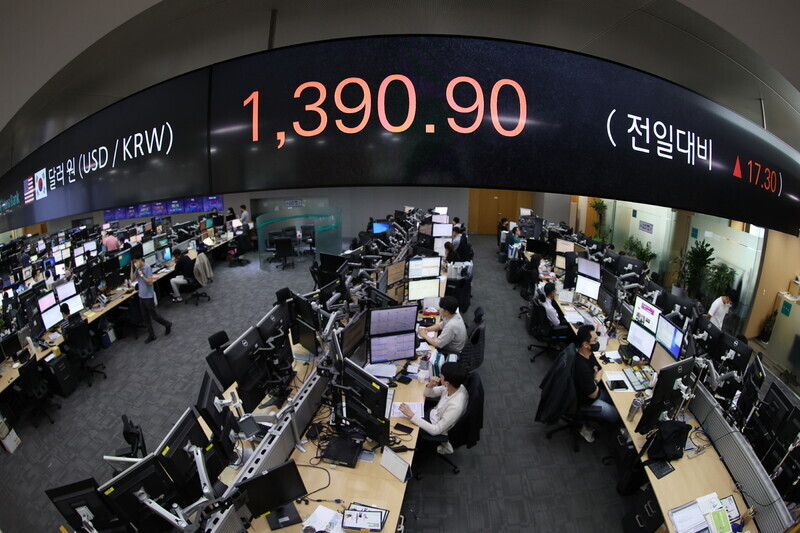hankyoreh
Links to other country sites 다른 나라 사이트 링크
Won-dollar exchange rate poised to break 1,400 won for third time in history

The won-dollar exchange rate has risen above 1,390 won, putting it on the cusp of 1,400 won.
The exchange rate rose at a faster clip after the US consumer price index for August jumped 8.3% from last year, bucking market predictions that inflation is nearing a peak.
The value of the South Korean won is likely to keep falling for even longer both because of gradually worsening domestic factors — including the trade deficit and sluggish exports — and because of the external factor of the US Federal Reserve, which is expected to move even faster to tighten monetary policy.
The won-dollar exchange rate closed Wednesday at 1,390.90 won, up 17.30 won from the previous day of trading, in the Seoul foreign exchange market.
The last time the exchange rate crept past 1,390 won was on March 30, 2009 (1,391.50 won), 13 years and five months ago, during the global financial crisis. The rate climbed as high as 1,395.50 won during trading.
If the exchange rate eventually breaks through the 1,400 won barrier, that would be the third time it has done so, following the Asian financial crisis in 1998 and the global financial crisis in 2009.
Korea’s benchmark KOSPI index barely stayed above 2,400 points on Wednesday, falling 1.56% (38.12 points) to 2,411.42 by the close.
The rise in the won-dollar exchange rate was affected by the fact that the US’ consumer price index for August published the previous night was up 8.3% year over year, higher than the market projection of 8.0%.
Markets were especially flustered by the US’ core consumer price index. While the consumer price index’s rate of increase in August was down slightly from the previous month (8.5%), the core consumer price index (which excludes highly volatile categories such as energy and food) rose at a rate of 6.3%, up from the previous month (5.9%).
That shows the core consumer price index is rising again after gradually decreasing over the past few months, from 6.5% in March to 6.2% in April, 6.0% in May and 5.9% in June and July.
The return of upward pressure on the core consumer price index, a key indicator of changes in the price of goods, means that US inflation could become more protracted than assumed. That dashes hopes that inflation will calm once international oil prices and cereal prices go down.
If central banks in the US and other major countries gear up for the long haul on the view that peak inflation is still a long way off, tight monetary policies are sure to be rolled out much faster around the globe.
“The longer inflation remains well above target, the greater the risk that the public sees higher inflation as the norm,” said Jerome Powell, chair of the US Federal Reserve, last week, noting that such a public perception would greatly increase the cost of curbing inflation.
Powell’s remarks amount to a warning that the Fed will move to aggressively tighten monetary policy.
Fiscal austerity in the US is causing the value of most major countries’ currencies to fall relative to the dollar. The troubling thing is that the won has depreciated more than other major currencies since last month.
External factors including interest rate hikes by the Fed and an economic slowdown in Europe are overlapping with internal factors including the trade deficit and sluggish exports by chipmakers.
“There are few signs of any factors either at home or abroad that could strengthen the won. I see the won-dollar exchange rate’s first resistance line as being 1,420 won, with a possibility of the rate going as high as 1,450 won this year,” said Kwon Ah-min, an analyst with NH Investment & Securities.
By Jun Seul-gi, staff reporter
Please direct questions or comments to [english@hani.co.kr]

Editorial・opinion
![[Column] Season 2 of special prosecutor probe may be coming to Korea soon [Column] Season 2 of special prosecutor probe may be coming to Korea soon](https://flexible.img.hani.co.kr/flexible/normal/500/300/imgdb/original/2024/0426/3317141030699447.jpg) [Column] Season 2 of special prosecutor probe may be coming to Korea soon
[Column] Season 2 of special prosecutor probe may be coming to Korea soon![[Column] Park Geun-hye déjà vu in Yoon Suk-yeol [Column] Park Geun-hye déjà vu in Yoon Suk-yeol](https://flexible.img.hani.co.kr/flexible/normal/500/300/imgdb/original/2024/0424/651713945113788.jpg) [Column] Park Geun-hye déjà vu in Yoon Suk-yeol
[Column] Park Geun-hye déjà vu in Yoon Suk-yeol- [Editorial] New weight of N. Korea’s nuclear threats makes dialogue all the more urgent
- [Guest essay] The real reason Korea’s new right wants to dub Rhee a founding father
- [Column] ‘Choson’: Is it time we start referring to N. Korea in its own terms?
- [Editorial] Japan’s rewriting of history with Korea has gone too far
- [Column] The president’s questionable capacity for dialogue
- [Column] Are chaebol firms just pizza pies for families to divvy up as they please?
- [Column] Has Korea, too, crossed the Rubicon on China?
- [Correspondent’s column] In Japan’s alliance with US, echoes of its past alliances with UK
Most viewed articles
- 1Is Japan about to snatch control of Line messenger from Korea’s Naver?
- 2‘We must say no’: Seoul defense chief on Korean, USFK involvement in hypothetical Taiwan crisis
- 3Up-and-coming Indonesian group StarBe spills what it learned during K-pop training in Seoul
- 4[News analysis] Using lure of fame, K-entertainment agency bigwigs sexually prey on young trainees
- 5[Column] Park Geun-hye déjà vu in Yoon Suk-yeol
- 6Is N. Korea threatening to test nukes in response to possible new US-led sanctions body?
- 7Division commander ordered troops to enter raging flood waters before Marine died, survivor says
- 8S. Korea “monitoring developments” after report of secret Chinese police station in Seoul
- 9Will NewJeans end up collateral damage in internal feud at K-pop juggernaut Hybe?
- 10Report reveals toxic pollution at numerous USFK bases